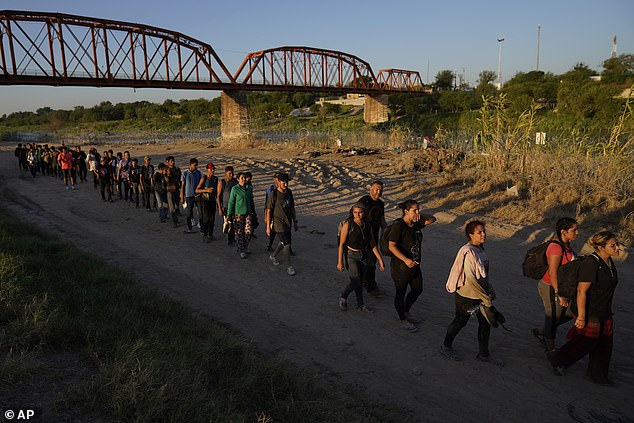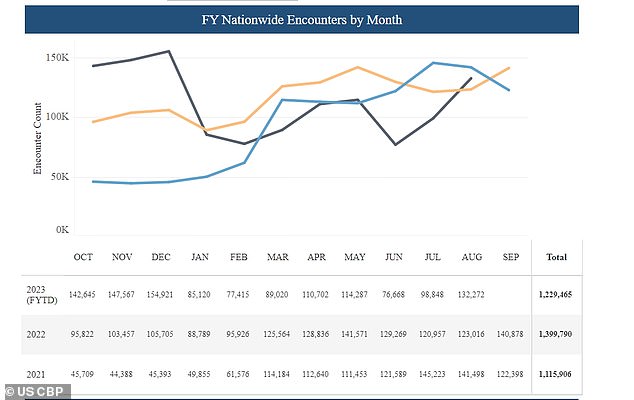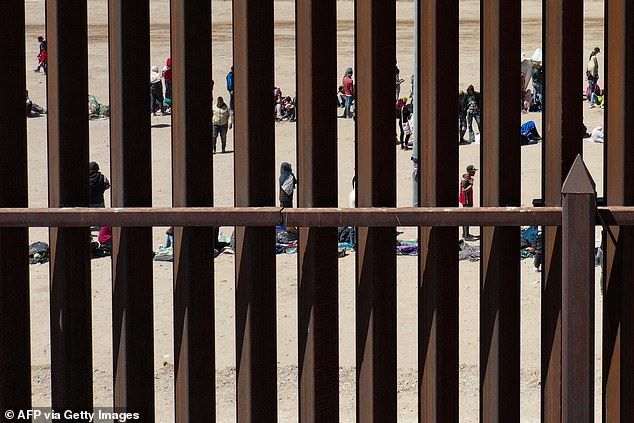Texas lawmakers introduce new bill that would see illegal immigrants sent straight back to Mexico or jailed for up to 20 years if they refuse to comply
- At least 3.7 million migrants have entered Texas since President Joe Biden took office
- One bill would allow authorities to send illegal immigrants back to Mexico
- A second bill creates new criminal charges for those who enter the state without permission
Texas lawmakers have introduced a proposal that could see illegal immigrants immediately deported back to Mexico — or even jailed for up to 20 years.
House Bill 4 would give law enforcement the ability to bring illegal immigrants to the border and drop them off at ports of entry. First time offenders should be given the opportunity to comply.
Migrants who do not voluntarily sign up to be returned to Mexico face charges and prison sentences ranging from six months to 20 years, depending on whether they have other outstanding charges or are repeat offenders.
“We have a crisis at our southern border that includes terrorists,” said Republican state Rep. David Spiller, who proposed the bill. told the Border Report.
“Texans know the Biden administration has failed to enforce our borders.”

Migrants who have crossed the Rio Grande and entered the U.S. from Mexico line up for processing by U.S. Customs and Border Protection, September 23, 2023, in Eagle Pass, Texas

At least 3.7 million migrants have entered Texas since 2021, according to U.S. Customs and Border Protection.
More than 1.2 million migrants have entered the Lone Star State over the past 12 months, according to statistics from U.S. Customs and Border Protection.
The actual total for fiscal year 2023 is higher because September figures have not yet been released.
Another 2.5 million migrants have entered the US through Texas since President Joe Biden took office.
That means Texas has seen at least 3.7 million border crossings under the Biden administration.
This figure only represents migrants apprehended by US authorities, not those who sneaked into the country undetected.

Migrants seeking asylum in the United States gather at a fence as members of the Texas National Guard stand guard aiming to stop them

Republican state Rep. David Spiller, who represents several counties near the Oklahoma state line north of Dallas, proposed HB4
“It is a groundbreaking bill that will empower Texans to protect Texans and return illegal aliens,” Spiller added.
“Our calls for help and enforcement of immigration laws have been ignored by President Biden. We’ve had enough.’
The House State Affairs Committee voted to move HB4 out of committee, meaning it will go to the full House for a vote by each member.
A second bill would create new criminal charges for migrants who enter illegally.
Senate Bill 11 would authorize state police to arrest illegal immigrant offenders. A first-time offender could be convicted of a misdemeanor, but the penalty would increase to a misdemeanor if the person has a criminal record and has repeatedly entered the country illegally.

Migrants lined up at the border wall to report to U.S. Customs and Border Protection near El Paso, Texas, in May
But critics say the bill is likely to face serious legal challenges, meaning it will never reach Gov. Greg Abbott’s desk.
“I don’t think either one is constitutional,” Democratic Sen. Juan “Chuy” Hinojosa told the newspaper. He voted against SB11 on Thursday.
“Federal law trumps state law, and I’m sure the state is looking for a way to challenge some of the federal government’s authority and undermine state law because of the immigration challenges we face along the border,’
There are also concerns that SB11 could lead to racial profiling. Several civil rights groups have vowed to sue Texas if the bills become law.
This bill needs a final vote in the Senate before moving to the House of Representatives.
